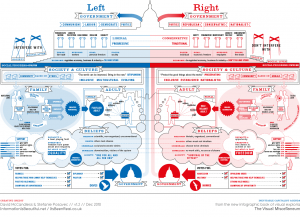Framing
Framing involves social construction of a social phenomenon – by mass media sources, political or social movements, political leaders, or other actors and organizations. Participation in a language community necessarily influences an individual's perception of the meanings attributed to words or phrases. Politically, the language communities of advertising, religion, and mass media are highly contested, whereas framing in less-sharply defended language communities might evolve imperceptibly and organically over cultural time frames, with fewer overt modes of disputation.
Framing in Politics
It is difficult to pinpoint precisely exactly what Left and Right stand for they are very generalist terms. The image to the right shows a general breakdown of what this is considered to be in the US, however to concretely state that the left believes in on policy and the right believes in another is a supposition.
The media have the power and tendency to immediately portray a political point to the public in either of two camps. However, this very method of portrayal, angle of attack can effect the perceptions of the general public which is trying to be objectively informed of the new policy[1]. The unfortunate consequence of this is instead of taking a new idea on the basis of merit by putting it into a specific camp you immediately generate opposition. In reality a political ideal can benefit everyone around the table.
- ↑ Issue framing in online voting advice applications: The effect of left-wing and right-wing headers on reported attitudes https://journals.plos.org/plosone/article?id=10.1371/journal.pone.0212555
